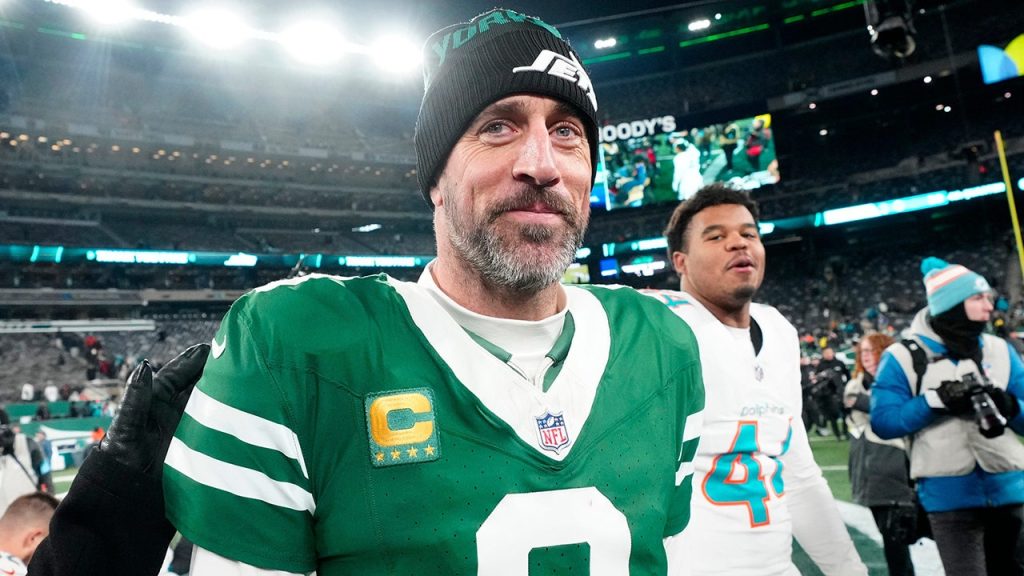Aaron Rodgers, the enigmatic quarterback whose career has been marked by both brilliance and controversy, stands at a crossroads. Following a turbulent two-year stint with the New York Jets, the future Hall of Famer must decide whether to continue his pursuit of gridiron glory or gracefully exit the stage. This offseason, NFL fans and analysts alike will be keenly observing Rodgers’ every move, attempting to decipher his intentions and predict the next chapter in his storied career. The weight of his decision rests heavily on the shoulders of a player who has experienced the highest highs and weathered the most challenging lows of professional football.
Rodgers’ time with the Jets, intended to be a triumphant resurgence, instead unfolded as a narrative of unfulfilled potential. Despite flashes of his trademark brilliance, the 2023 season saw the Jets stumble to a disappointing 5-12 record, casting a shadow over Rodgers’ individual performance of 3,897 passing yards and 28 touchdowns. The inconsistency that plagued the team also seemed to affect Rodgers, raising questions about his ability to consistently perform at the elite level that defined his earlier years. The firing of head coach Robert Saleh and general manager Joe Douglas mid-season further compounded the challenges facing the team and its star quarterback, creating an atmosphere of instability and uncertainty.
Adding to the complexity of Rodgers’ decision is the looming specter of age. Should he choose to return for another season, he would be 42 years old by December, a milestone rarely reached by quarterbacks in the physically demanding NFL. The question of whether his body can withstand the rigors of another season, and whether he can maintain the arm strength and mobility necessary to compete at a high level, remains a significant factor in his deliberations. While occasional glimpses of his former brilliance have offered hope, the consistency required for sustained success has proven elusive.
Amidst the uncertainty surrounding Rodgers’ future, one voice of support emerges from an unlikely source: his predecessor in Green Bay, Brett Favre. Favre, himself a legendary quarterback known for his longevity and late-career resilience, believes that Rodgers still possesses the “juice” to compete effectively in the NFL. Citing Rodgers’ performance in the final game of the season as evidence of his remaining abilities, Favre contends that the flashes of brilliance seen throughout the year are indicative of the quarterback’s untapped potential. He encourages Rodgers to continue playing if he still harbors the desire to prove himself, arguing that the glimpses of his former self suggest that he is capable of reclaiming his elite status.
Favre’s perspective, while potentially biased, offers a compelling counterpoint to the narratives of decline that have surrounded Rodgers in recent years. It highlights the enduring belief in Rodgers’ talent and the possibility of a late-career renaissance. While acknowledging his own misjudgment of Rodgers’ potential success with the Jets, Favre emphasizes the importance of Rodgers’ own internal drive and desire to compete. He suggests that if the fire still burns within Rodgers, he should heed its call and continue his pursuit of excellence on the field.
The coming days and weeks will be crucial for both Rodgers and the Jets organization. Rodgers must carefully weigh his options, considering his physical condition, his competitive drive, and the potential impact of another season on his legacy. The Jets, in turn, must assess their commitment to Rodgers and determine whether they believe he can be the centerpiece of a winning team. The decisions made by both parties will have far-reaching consequences, shaping the landscape of the NFL and determining the fate of a quarterback whose career has been as captivating as it has been complex. The football world watches and waits, eager to witness the next act in the Aaron Rodgers saga.

